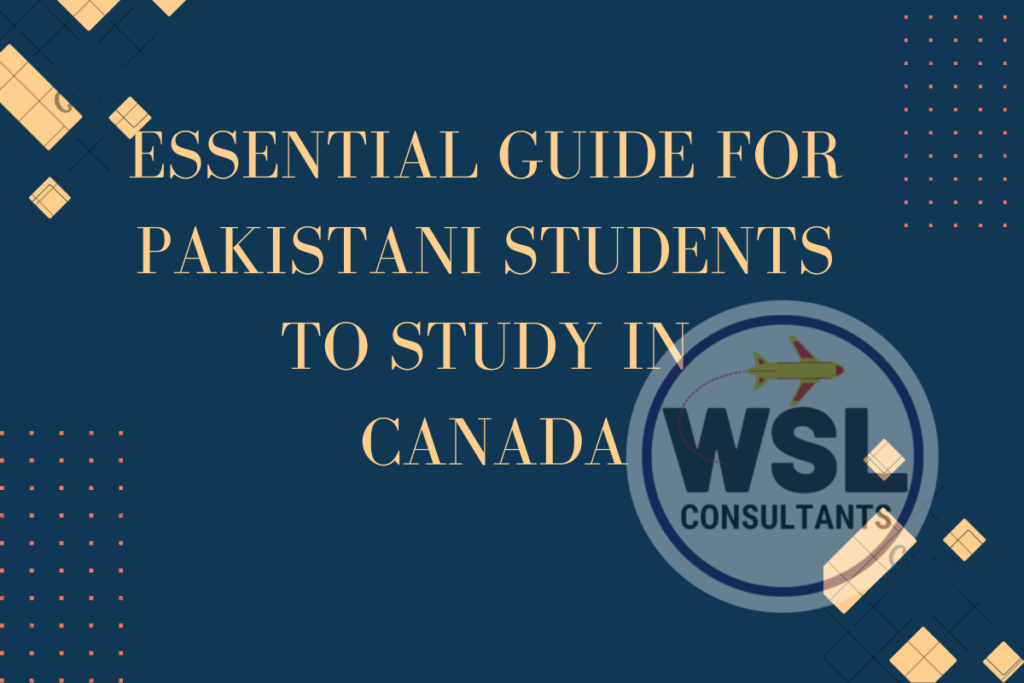Essential Guide for Pakistani Students to Study in Canada
Study in Canada from Pakistan offers a unique and enriching experience, with access to high-quality education and a diverse cultural landscape. Embarking on an educational journey from Pakistan to Canada offers a pathway to world-class education, exposure to a diverse cultural landscape, and the opportunity to develop global perspectives. Canada, known for its high academic standards, multicultural society, and welcoming attitude towards international students, is a popular destination for Pakistani students seeking quality higher education abroad.

This guide aims to provide detailed insights into the process of study in Canada for students from Pakistan, highlighting key areas such as admission procedures, financial planning, visa requirements, and cultural adaptation. It’s designed to equip you with the necessary information and tips to make your transition to study in Canada as smooth and successful as possible.
Detailed Guide for study in Canada
Researching Institutions and Programs:
For Pakistani students aiming to study in Canada, researching institutions and programs is a pivotal first step in the journey. Canada is renowned for its diverse range of high-quality educational institutions, each offering unique programs and experiences. The country’s education system is among the best in the world, known for its emphasis on research, innovation, and academic excellence. Pakistani students should start by identifying their academic interests and career goals, which will guide them in selecting the right institution and program. Major Canadian cities like Toronto, Vancouver, and Montreal host some of the top universities and colleges, known for their inclusive and multicultural environments. Additionally, institutions to study in Canada offer a broad spectrum of programs ranging from science and technology, business and economics, to arts and humanities, catering to a wide array of academic interests.
When researching programs, Pakistani students should consider various factors like the program curriculum, faculty expertise, campus facilities, and opportunities for research or internships. Moreover, it’s important to look into the global rankings and accreditation of institutions, as these factors play a significant role in the value of the degree obtained. Canada’s education system is also characterized by its practical approach to learning, with many programs offering co-op and internship opportunities that provide real-world experience and enhance employability after graduation. Furthermore, while study in Canada, Pakistani students have the opportunity to immerse themselves in a bilingual environment, with many institutions offering courses in both English and French. This linguistic aspect not only enriches the academic experience but also opens up more opportunities in the global job market. Overall, for Pakistani students, study in Canada is not just about acquiring a degree; it’s an investment in a holistic educational experience that fosters both personal and professional growth.
Admission Requirements:
For Pakistani students aspiring to study in Canada, understanding and fulfilling the admission requirements is crucial. These requirements often vary by institution and program, but there are several common elements. Academic transcripts are a primary requirement, with undergraduate programs typically considering higher secondary school certificates, and postgraduate programs focusing on undergraduate degrees and grades. Standardized test scores, such as the SAT, ACT, GRE, or GMAT, might be required depending on the program.
English language proficiency is essential, as the medium of instruction in Canadian institutions is predominantly English. Tests like the IELTS or TOEFL are commonly accepted to demonstrate this proficiency, with minimum score requirements varying across institutions. Letters of Recommendation are often vital, especially for postgraduate studies, where they should ideally come from individuals familiar with the applicant’s academic or professional capabilities.
A Statement of Purpose or Personal Essay is usually a key component of the application, allowing students to articulate their academic interests, career objectives, and reasons for choosing a particular program and university. Additionally, for certain programs, especially at the postgraduate level, applicants may need to submit a detailed CV or resume. For fields such as arts, design, or architecture, a portfolio or work samples may also be a prerequisite. In some cases, an interview process might be conducted to assess the applicant’s suitability for the program.
While not directly linked to admissions, proof of financial support is necessary when applying for a study permit, ensuring that students can sustain themselves financially for tuition and living costs to study in Canada. It is essential for applicants to meticulously check and adhere to the specific requirements of each university and program they are interested in, as these can vary. Preparing well in advance and ensuring all criteria are met are key steps towards a successful application to study in Canada.
Application Process
The application process for Pakistani students wishing to study in Canada starts with selecting the right universities and programs, taking into account factors like academic reputation, location, and tuition costs. Meeting the admission requirements is crucial, which typically includes providing academic transcripts, English language proficiency test scores (like IELTS or TOEFL), and specific prerequisites for the chosen program. Gathering essential documents is the next step, involving transcripts, standardized test scores, recommendation letters, a statement of purpose, and possibly a CV or portfolio for certain programs.
Once the application materials are prepared, the next phase involves filling out and submitting the application forms to each chosen institution, usually accompanied by a fee. This is followed by tracking the application status and possibly participating in interviews or additional assessments if required. After receiving and accepting an offer, the final steps include applying for a permit to study in Canada, which requires proof of acceptance and financial support, and preparing for the move to Canada. This preparation involves arranging travel, accommodation, and understanding the legal rights and responsibilities as study in Canada.
Financial Planning:
Financial planning is a critical aspect for Pakistani students considering study in Canada, as it involves significant expenses including tuition, living costs, travel, and insurance. Tuition fees vary widely depending on the institution and program, with undergraduate courses generally ranging from CAD 15,000 to CAD 30,000 per year, and postgraduate courses often costing more. Living expenses, which include accommodation, food, transportation, and miscellaneous costs, can range from CAD 10,000 to CAD 15,000 annually, depending on the city. Students should also account for one-time costs such as visa application fees, airfare, and initial setup costs upon arrival to study in Canada. It’s crucial to have a comprehensive budget plan that covers the entire duration of study in Canada.
To manage these costs, students should explore various financial aid options available to international students. Scholarships, grants, and bursaries offered by Canadian institutions, private organizations, or Pakistani government bodies can significantly reduce the financial burden. Some universities offer work-study programs, allowing students to work part-time on campus. Additionally, students with study permits are allowed to work off-campus for up to 20 hours per week during academic sessions and full-time during scheduled breaks, providing a valuable source of income. It’s also advisable to consider opening a Canadian bank account and understanding the nuances of managing finances in a foreign country. Early and careful financial planning is essential in ensuring a smooth and stress-free educational experience to study in Canada.
Study Permit Application
Obtaining a study permit is an essential step for Pakistani students planning to study in Canada. The process begins with securing an acceptance letter from a designated learning institution (DLI) in Canada. The application for the study permit includes submitting forms, paying fees, and providing necessary documents, such as a valid passport, the acceptance letter, proof of sufficient funds to cover tuition and living expenses, and a letter of explanation outlining your study plans. Additional requirements may include a medical exam and a police clearance certificate to ensure you’re in good health and don’t have a criminal record.
The study permit defines the conditions of your stay in Canada, including work eligibility and travel permissions. It’s important to convince Canadian immigration officials that you intend to leave Canada upon completing your studies. The permit typically expires 90 days after your studies end. Pakistani students should start this process immediately after receiving their acceptance to allow sufficient time for permit processing, keeping in mind that processing times can vary. Meticulous attention to detail and timely submission of all documents are crucial for a successful study permit application.
Health Insurance and Healthcare
Health insurance and healthcare are vital considerations for Pakistani students planning to study in Canada. Canadian healthcare is renowned for its quality, but it operates differently than in Pakistan, and international students are not automatically covered under the Canadian healthcare system. Each province and territory in Canada has its own health insurance plan, and coverage for international students varies across regions.
In some provinces, international students are eligible for public health insurance, which may require them to apply upon arrival and possibly serve a waiting period before coverage begins. In provinces where international students are not covered by public healthcare, or during waiting periods, students must purchase private health insurance. This private insurance is crucial to cover medical expenses during their stay in Canada, such as visits to doctors, hospital stays, and medical procedures. The cost and coverage of private health insurance plans can vary significantly, so students should research and choose a plan that suits their needs and budget.
It’s important for Pakistani students to arrange for health insurance before their departure to Canada. Some educational institutions offer health insurance plans for their international students, or students can purchase a plan independently. Ensuring comprehensive health coverage is essential, as medical treatment in Canada can be very expensive without insurance. Staying informed about the healthcare services available on campus and in the local community, including how to access emergency medical care, is also an important part of preparing for a healthy and safe study in Canada.
Housing Options
Housing is a critical aspect of planning for Pakistani students intending to study in Canada, with several options available to suit different preferences and budgets. The two primary types of housing are on-campus and off-campus accommodations.
On-campus housing, typically provided by the educational institutions, includes dormitories or residence halls. These facilities offer a convenient and safe living environment, often located within walking distance of classrooms, libraries, and other campus amenities. Living on-campus is an excellent way for students to integrate into university life, providing ample opportunities for social interaction and participation in campus activities. These accommodations are usually furnished and may offer meal plans. However, on-campus housing can be more expensive and might have limited availability, so it’s advisable to apply early.
Off-campus housing provides more independence and is often less expensive than on-campus options. It includes renting apartments, houses, or rooms in shared accommodations. Students can choose their location, type of accommodation, and roommates, allowing for more flexibility. This option requires dealing with landlords, utility bills, and sometimes commuting to campus, which adds an element of responsibility but also offers a more immersive experience into Canadian life and culture. When choosing off-campus housing, it’s important to consider factors like proximity to the university, public transportation, neighborhood safety, and nearby amenities.
For Pakistani students, the choice between on-campus and off-campus housing depends on personal preferences, budget, and the kind of experience they are looking to have while study in Canada. Regardless of the choice, it’s crucial to start the search early and be aware of the terms and conditions of any rental agreements before making a commitment.
Cultural and Climate Adaptation
Cultural adaptation is an important aspect for Pakistani students embarking on their study in Canada. The Canadian society is known for its diversity and inclusivity, offering a mosaic of cultures from around the world. This multicultural environment provides an enriching experience, but it can also present challenges as students adjust to new social norms and practices. To ease this transition, students should engage actively with the campus community, participate in social and cultural events, and seek out student support services that many Canadian universities offer. Additionally, connecting with fellow international students and local Canadian peers can provide a support network, easing the feeling of homesickness and cultural shock. Embracing Canadian culture, including its emphasis on punctuality, politeness, and a more informal and open communication style, is essential for a smooth cultural adaptation.
Climate adaptation is another significant factor for Pakistani students in Canada, especially considering the stark difference between the climates of Pakistan and Canada. Canadian winters can be particularly challenging, with temperatures often dropping below freezing, accompanied by snow and ice. It’s crucial for students to prepare adequately for this, which includes investing in proper winter clothing such as insulated jackets, waterproof boots, gloves, and hats. Understanding how to navigate daily life in these conditions, including using public transportation and maintaining personal safety during extreme weather, is important. On the other hand, Canadian summers, though short, can be quite pleasant and offer an opportunity to explore the country’s beautiful landscapes and outdoor activities. Adapting to these seasonal changes is a part of the learning to study in Canada, enriching their overall study abroad journey.
Legal Rights as an International Student
As an international student in Canada, understanding and exercising your legal rights is crucial for a safe and fulfilling educational experience. Firstly, international students are entitled to work part-time up to 20 hours per week during academic sessions and full-time during scheduled breaks, such as winter or summer holidays, without requiring an additional work permit. This right is crucial for financial independence and gaining work experience in Canada. Moreover, students have the right to access healthcare services, though this varies by province, and are protected under Canadian law against discrimination based on race, religion, gender, or sexual orientation. It’s also important for students to be aware of their rights regarding tenancy if they choose off-campus housing, including rights and responsibilities under the lease agreement.
Conclusion:
Embarking on a study in Canada from Pakistan is not just a pursuit of academic excellence but also a venture into a multicultural world that fosters personal growth and global understanding. Meticulous planning, understanding of legal and cultural aspects, and a readiness to adapt are key to making the most of this enriching experience.
FAQs:
- What is the average cost of studying in Canada for Pakistani students?
- The cost varies depending on the institution and program but generally ranges from CAD 15,000 to CAD 30,000 per year for tuition. Living expenses are additional.
- Do I need to take an English proficiency test?
- Yes, Pakistani students usually need to take the IELTS or TOEFL as part of the admission requirements.
- Can I work while studying in Canada?
- Yes, students with a study permit can work up to 20 hours per week during academic sessions and full-time during scheduled breaks.
- Are scholarships available for Pakistani students in Canada?
- Yes, there are various scholarships offered by Canadian universities and external organizations for international students, including those from Pakistan.
- What is the process for obtaining a Canadian study permit?
- After receiving your acceptance letter, you apply online or at a visa application center, submit required documents, and may need to attend an interview.
- Is health insurance mandatory for Pakistani students in Canada?
- Yes, international students must have health insurance coverage for the duration of their stay in Canada.
- Can I stay in Canada after my studies?
- Yes, through programs like the Post-Graduation Work Permit Program (PGWPP), students can work in Canada after completing their studies.
- What is the best time to apply for Canadian universities?
- Applications typically open a year in advance, and it’s best to apply as early as possible, considering application deadlines.
- How long does it take to get a Canadian study permit?
- The processing time varies but usually takes several weeks to a few months.
- Is it easy to adapt to the Canadian climate?
- It can be challenging, especially during the winter months. It’s important to come prepared with appropriate clothing and an open mind to adapt to the cold weather.



